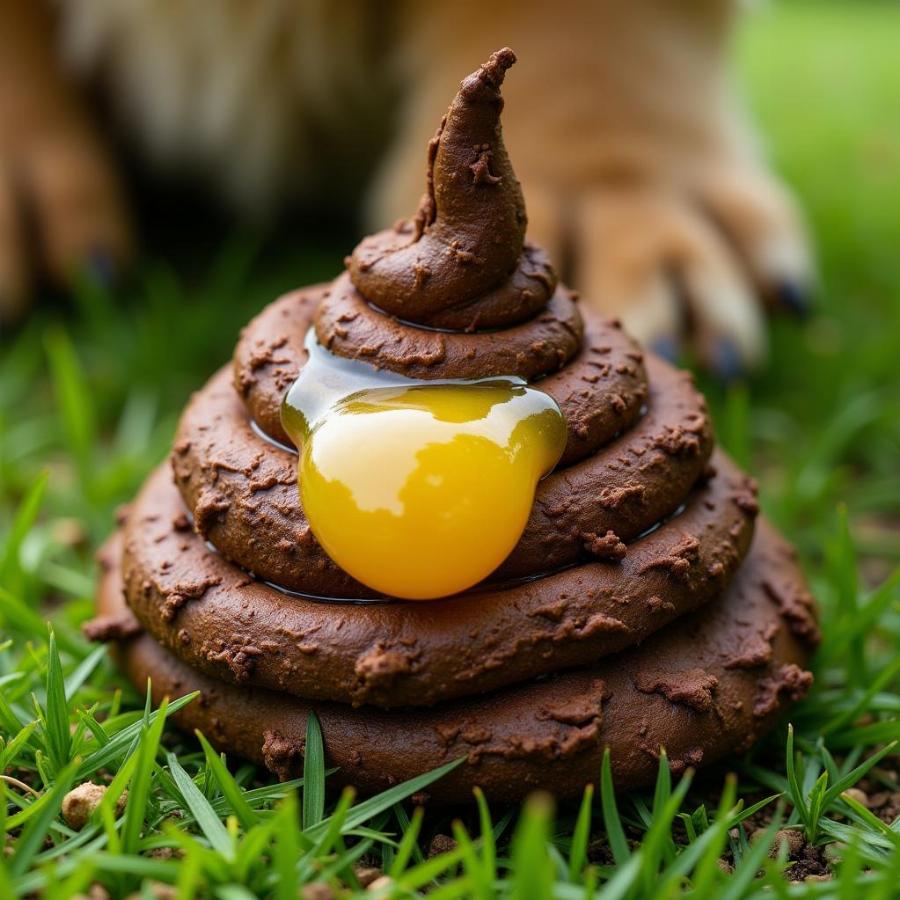Dog poop with yellow mucus can be alarming for any pet owner. Understanding what causes this and when it warrants a vet visit is crucial for ensuring your furry friend’s health. This article will delve into the reasons behind yellow mucus in dog stool, what it could mean, and the steps you should take if you notice this concerning symptom.
Understanding Yellow Mucus in Dog Stool
Seeing yellow mucus in your dog’s feces can indicate several different things, ranging from minor dietary indiscretions to more serious underlying health issues. The yellow color typically comes from bile, a digestive fluid produced by the liver. While a small amount of mucus is normal in dog poop, excessive amounts, especially accompanied by a change in color, consistency, or frequency, should be investigated. It’s crucial to observe your dog for any other symptoms, such as vomiting, lethargy, or loss of appetite, as these can provide further clues about the underlying cause.
 Dog Poop with Yellow Mucus
Dog Poop with Yellow Mucus
Common Causes of Yellow Mucus in Dog Stool
Several factors can contribute to the presence of yellow mucus in dog feces. One common cause is dietary indiscretion, where your dog has eaten something they shouldn’t have, like spoiled food or garbage. This can irritate the digestive tract, leading to increased mucus production. Stress can also play a role, as it can affect gut motility and lead to changes in bowel movements. Inflammatory bowel disease (IBD) is a more serious possibility, characterized by chronic inflammation of the digestive tract. Parasites, such as worms, can also irritate the gut and cause mucus in the stool.
When Should You Visit the Vet?
While occasional yellow mucus in your dog’s stool may not be cause for immediate concern, persistent or worsening symptoms warrant a trip to the veterinarian. yellow mucus in dog poop coupled with other signs like blood in the stool, vomiting, diarrhea, lethargy, or changes in appetite should be evaluated promptly. Your vet will perform a thorough examination and may recommend further testing, such as fecal analysis, blood work, or imaging, to determine the underlying cause and recommend appropriate treatment.
Diagnosing and Treating the Underlying Issue
Diagnosing the cause of yellow mucus in dog poop involves a combination of physical examination and diagnostic tests. dog stool colors can provide initial clues, but further testing is usually necessary. Your vet might perform a fecal examination to check for parasites, blood tests to assess organ function, and imaging studies to visualize the digestive tract. Treatment will depend on the diagnosis and can range from dietary changes and medication for parasites to more intensive therapies for conditions like IBD.
Preventing Future Occurrences
Once the underlying cause of the yellow mucus has been addressed, you can take steps to prevent future occurrences. Feeding your dog a high-quality, balanced diet and avoiding table scraps can help maintain a healthy digestive system. Regular deworming can prevent parasitic infections, and managing stress through exercise and mental stimulation can also contribute to better gut health. mucus poop in dogs is often a sign of an underlying issue, so preventive measures are crucial. Remember, a proactive approach to your dog’s health is always the best course of action.
Conclusion
Yellow mucus in dog poop can be a sign of several underlying issues, ranging from minor dietary indiscretions to more serious conditions. Careful observation, prompt veterinary attention when needed, and preventative measures are essential for ensuring your dog’s digestive health and overall well-being. Don’t hesitate to contact your veterinarian if you have any concerns about yellow dog poop meaning or any changes in your dog’s bowel movements.
FAQ
- Is a little mucus in dog poop normal? Yes, a small amount of mucus is often considered normal.
- What does bright yellow mucus in dog poop mean? It could indicate a problem with bile production or digestion.
- Can stress cause mucus in dog poop? Yes, stress can affect gut motility and lead to changes in stool.
- How can I prevent yellow mucus in my dog’s poop? A balanced diet, regular deworming, and stress management can help.
- When should I call the vet about mucus in my dog’s stool? If the mucus is persistent, excessive, or accompanied by other symptoms.
- What tests might my vet perform? Fecal analysis, blood tests, and imaging studies.
- What are the treatment options for yellow mucus in dog poop? Treatment depends on the underlying cause and may include dietary changes, medication, or other therapies.
Beaut Dogs is the premier destination for dog lovers, providing trustworthy and insightful information on all aspects of dog ownership. From breed selection to health care, we offer expert advice to help you navigate the wonderful world of canine companionship. Beaut Dogs is committed to providing the best possible care for your furry friends. When you need support, please contact Email: [email protected] so that Beaut Dogs can answer in detail and accurately.